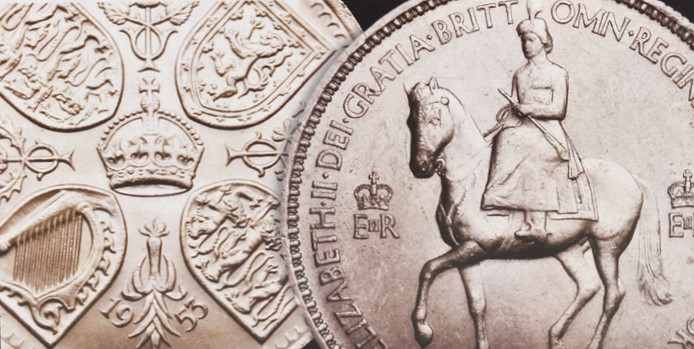
Although Elizabeth II became Queen on 6th February 1952, following the sad passing of her father, King George VI, she was not formally invested until her coronation on the 2nd June 1953.
As a result, the Royal Mint had almost 18 months to prepare coinage for the new monarch, a process which involves utilising years of royal tradition. Here, we will be exploring the complete collection of 1953 Queen Elizabeth II coronation coins…
Mary Gillick’s Royal Portrait
The first process was to find a new royal portrait to replace the image of George VI, designed by Humphrey Paget, which had been used on all circulating British coinage since 1937. A competition was launched in which 17 sculptors entered their portrait designs of Elizabeth II, based on photographs taken by Dorothy Wilding.
The portrait chosen was designed by English sculptor Mary Gillick, showing a youthful Queen with her hair tied in a fillet and wreath; her inspiration came from the first coinage portrait of Queen Victoria. It was unveiled to the public as the new royal portrait and was used on coins in the United Kingdom and other countries from 1953 until 1970, although its use continued on Maundy coinage until the very end of the reign.
Gilbert Ledward’s Equestrian Portrait
By this point, the crown had already fallen out of circulation but was issued in 1953 as a commemorative piece. This crown is the first of Queen Elizabeth II’s reign and features an ‘Equestrian Portrait’ of Queen Elizabeth II on horseback, rather than the usual facial profile, designed by Gilbert Ledward. This is the first of only four occasions (1953, 1977, 2002, 2022) on which Queen Elizabeth II has been depicted this way on our coinage.
The Complete Set of British Coins
The coinage of 1953 consists of ten denominations which were all made from base metal alloys such as cupro-nickel, nickel-brass and bronze. Except for the crown, each coin features the new portrait of Elizabeth II by Mary Gillick, with a mixture of different designs on the reverses. Humphrey Paget, Harold Wilson Parker, Cecil Thomas and Edgar Fuller to name a few, were all responsible for the reverse designs on these British coinage denominations.
1953 Denominations – Reverse:
Crown – Four Shields
Halfcrown – Crowned Shield
Florin – National Flowers
English Shilling – Three Lions
Scottish Shilling – Single Lion
Sixpence – National Flowers
Threepence – Portcullis
Penny – Britannia
Half Penny – Golden Hind
Farthing – Wren
Many people today would not be aware that there were both English and Scottish design shilling coins in the pre-decimal era. The 1953 Halfcrown, Florin, both Shillings, Sixpence and Threepence were all new designs never seen before, making each of these coins the very first of their kind.
In fact, all the coins are special. The crown was a one-year issue for the coronation itself but all the remaining nine coins are also what is known as one year types: that is, their design was only issued for one year. This is because in 1953 Queen Elizabeth II’s titles were changed and this meant that the coins of 1953 are the only types ever to feature the original royal titles.
Official coin sets released to mark the coronation include the 1953 ten coin specimen sets, the 1953 ten coin VIP sets, the 1953 nine coin circulation sets and the 1953 Gold Proof institutional sets. The specimen sets, also known as ‘proof sets’, were issued in a maroon leatherette case, lined with red flocked fabric and silk. The VIP sets were made as gifts for dignitaries, employees and other important people and had distinctive differences compared with a regular specimen set.
The nine-coin circulation sets contained a standard group of circulation coins, produced using the standard circulating coinage techniques. Although not Proof quality, these coins can be found in mint condition, making them enthralling to collectors. Finally, a tiny number of Gold Proof sets were also made which were not made commercially available and were given to major institutional collections for completeness, containing a 1953 Gold Sovereign.
A determined effort by the Hattons of London heritage specialists has meant we can now offer the complete set of British coins and commemorative stamps issued for the 1953 Coronation. This is an unusual opportunity: these are after all coins and stamps that are virtually 70 years old. Secure yours HERE.
